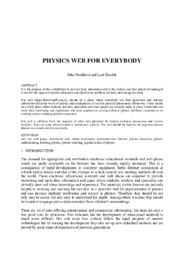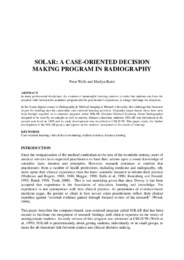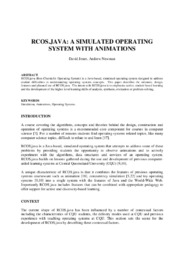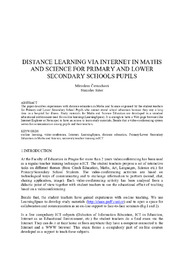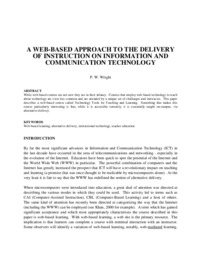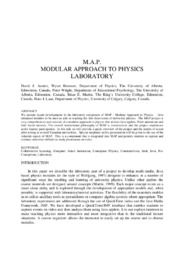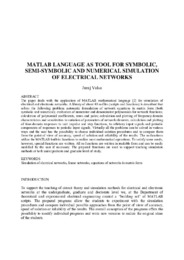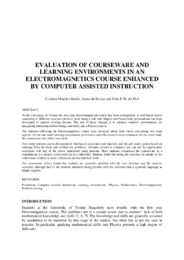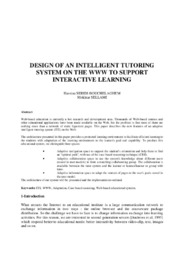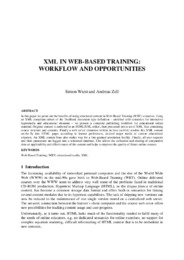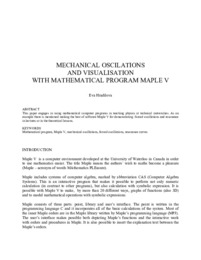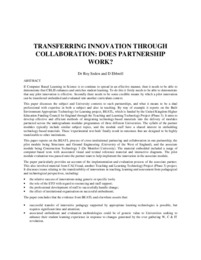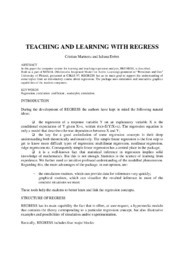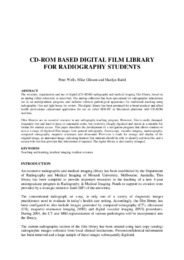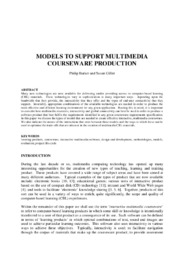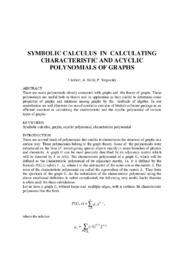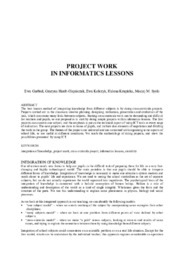Browsing ΕΝΔΟ - Ενδοπανεπιστημιακή ερευνητική παραγωγή Πανεπιστημίου Κύπρου by Issue Date
Now showing items 41-60 of 601
-
Physics web for everybody
(Pedagogical Faculty of University of Ostrava, 2001)It is the purpose of this contribution to provide basic information about the creation and first period of running of a web for the support of physics education and about some problems we have met during this work. Our web ... -
Solar: a case-oriented decision making program in radiography
(Pedagogical Faculty of University of Ostrava, 2001)In many professional disciplines, the creation of meaningful learning contexts in order that students can form the essential links between the academic program and the practitioner’s experience, is a huge challenge for ... -
Rcos.java: a simulated operating system with animations
(Pedagogical Faculty of University of Ostrava, 2001)RCOS.java (Ron Chernich's Operating System) is a Java-based, simulated operating system designed to address student difficulties in understanding operating systems concepts. This paper describes the rationale, design, features ... -
Distance learning via internet in maths And science for primary and lower secondary schools pupils
(Pedagogical Faculty of University of Ostrava, 2001)The paper describes experiences with distance education in Maths and Science organised by the student teachers for Primary and Lower Secondary School Pupils who cannot attend school education because they stay a long time ... -
Postcourse - www-based course on Databases
(Pedagogical Faculty of University of Ostrava, 2001)The objective of this paper is to report the experience with further development and use of Postcourse a webbased course on databases. -
A web-based approach to the delivery of instruction on information and Communication technology
(Pedagogical Faculty of University of Ostrava, 2001)While web-based courses are not new they are in their infancy. Courses that employ web-based technology to teach about technology are even less common and are attended by a unique set of challenges and intricacies. This ... -
M.A.P. modular approach to physics Laboratory
(Pedagogical Faculty of University of Ostrava, 2001)We present recent developments in the laboratory component of MAP - Modular Approach to Physics - Java enhanced modules to be used as aids in teaching the first three terms of university physics. The MAP project is very ... -
Matlab language as tool for symbolic, semi-symbolic and numerical simulation of electrical networks
(Pedagogical Faculty of University of Ostrava, 2001)The paper deals with the application of MATLAB mathematical language [2] for simulation of electrical and electronic networks. A library of about 40 m-files (scripts and functions) is described that solves the following ... -
Evaluation of courseware and learning environments in an electromagnetics course enhanced by computer assisted instruction
(Pedagogical Faculty of University of Ostrava, 2001)At the University of Twente the first year electromagnetism course has been restructured. A web-based course consisting of different exercises (most of them using a link with Maple) and PowerPoint presentations has ... -
Design of an intelligent tutoring system on the www to support Interactive learning
(Pedagogical Faculty of University of Ostrava, 2001)Web-based education is currently a hot research and development area. Thousands of Web-based courses and other educational applications have been made available on the Web, but the problem is that most of them are nothing ... -
How to generate clever questions and why
(Pedagogical Faculty of University of Ostrava, 2001)Teaching/learning process can be improved by using clever questions. This idea is remarkably old. Since ancient Greek philosophers used questions while carrying on dialogues with students in order to make them clever. Generally ... -
XML in web-based training: Workflow and opportunities
(Pedagogical Faculty of University of Ostrava, 2001)In this paper we point out the benefits of using structured content in Web-Based Training (WBT) scenarios. Using an XML compliant subset of the DocBook document type definition – enriched with semantics for interactive hypermedia ... -
Using of tips programs packages in engineering education
(Pedagogical Faculty of University of Ostrava, 2001)One of the tasks of higher school is to teach students for creative work. This task equally concerns both to students of natural sciences specialities, and the pupil – “humanities”. In this report the main features of the ... -
Mechanical oscilations and visualisation with mathematical program maple v
(Pedagogical Faculty of University of Ostrava, 2001)This paper engages in using mathematical computer programs in teaching physics at technical universities. As an example there is mentioned making the best of software Maple V for demonstrating forced oscillations and ... -
Transferring innovation through Collaboration: does partnership Work?
(Pedagogical Faculty of University of Ostrava, 2001)If Computer Based Learning in Science is to continue to spread in an effective manner, then it needs to be able to demonstrate that CBLIS enhances and enriches student learning. To do this it firstly needs to be able to ... -
Teaching and learning with regress
(Pedagogical Faculty of University of Ostrava, 2001)In this paper the computer system for learning and teaching regression analysis, REGRESS, is described. Built as a part of MIMAL (Multimedia Integrated Model for Active Learning) generated at “Petroleum and Gas” University ... -
CD-ROM based digital film library for radiography students
(Pedagogical Faculty of University of Ostrava, 2001)The structure, organisation and use of digital (CD-ROM) radiography and medical imaging film library, based on an analog (film) collection, is described. The analog collection has been specialised for radiographic ... -
Models to support multimedia Courseware production
(Pedagogical Faculty of University of Ostrava, 2001)Many new technologies are now available for delivering and/or providing access to computer-based learning (CBL) materials. These technologies vary in sophistication in many important ways - depending upon the bandwidth ... -
Symbolic calculus in calculating characteristic and acyclic polynomials of graphs
(Pedagogical Faculty of University of Ostrava, 2001)There are many polynomials closely connected with graphs and the theory of graphs. These polynomials are useful both in theory and its application as they enable to determine some properties of graphs and relations among ... -
Project work in informatics lessons
(Pedagogical Faculty of University of Ostrava, 2001)The best known method of integrating knowledge from different subjects is by doing cross-curricula projects. Projects carried out in the classroom involve planning, designing, realisation, presentation and evaluation of ...
